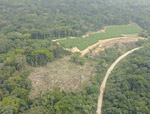Over 25 years after people stopped growing cardamom in Sri Lanka’s Knuckles Forest Reserve (KFR), the spice crop is still having an impact on the forest, according to a recent study in Forest Ecology and Management. The clearing of understory plants and the use of fertilizers continue to shape the forest in the protected area.
Cardamom is grown in the shade of the rainforest canopy and so does not require deforestation like other crops. However, often forest vegetation beneath the canopy is cleared. In Knuckles Forest Reserve, researchers found a lower density of plants and different species in the cardamom crop forests versus untouched forests even though the crop was banned in the area since 1985.
“We conclude that cardamom cultivation results in a net loss of tree stems through weeding and opening of the canopy to promote cardamom production,” the scientists write.
The researchers also found lingering changes to the soil. They measured higher levels of phosphorous and exchangeable potassium in the soil where cardamom used to grow, linking them to the use of fertilizers for the crop.
But pesticides are another concern: a study last year in Kerala, India found water and soil contaminated with pesticides due to cardamom production, including DDT and mercury.
For Knuckles Forest Reserve, which is home to over a thousand flowering plant species and nearly 250 vertebrates, the researchers recommend action to “mitigate [the] effects” of past cardamom production.
CITATION: Balram Dhakala, Michelle A. Pinarda, Nimal Gunatillekeb, Savitri Gunatillekeb, Madawala Weerasingheb, Dharmaparakramac,
David Burslem. Impacts of cardamom cultivation on montane forest ecosystems in Sri Lanka. Forest Ecology and Management. 2012.
Related articles
Scientists say massive palm oil plantation will “cut the heart out” of Cameroon’s rainforest

(03/15/2012) Eleven top scientists have slammed a proposed palm oil plantation in a Cameroonian rainforest surrounded by five protected areas. In an open letter, the researchers allege that Herakles Farm, which proposes the 70,000 hectare plantation in southwest Cameroon, has misled the government about the state of the forest to be cleared and has violated rules set by the Roundtable on Sustainable Palm Oil (RSPO), of which it’s a member. The scientists, many of whom are considered leaders in their field, argue that the plantation will destroy rich forests, imperil endangered species, and sow conflict with local people.
As Amazon deforestation falls, food production rises
(01/09/2012) A sharp drop in deforestation has been accompanied by an increase in food production in the Brazilian state of Mato Grosso, reports a new study published in the journal Proceedings of the National Academy of Science. The research argues that policy interventions, combined with pressure from environmental groups, have encouraged agricultural expansion in already-deforested areas, rather than driving new forest clearing.
Agriculture group to spend 10 years on forest research
(12/07/2011) Recognizing the global importance of the world’s vanishing forests, a 10-year-long research program will focus on the interconnection between agriculture and forests. Conducted by CGIAR, a global agriculture group concerned with sustainability, the research program will look at ways to decrease forest loss and degradation.
Wildlife official: palm oil plantations behind decline in proboscis monkeys

(12/05/2011) The practice of palm oil plantations planting along rivers is leading to a decline in proboscis monkeys (Nasalis larvatus) in the Malaysian state of Sabah on Borneo, says the director of the Sabah Wildlife Department, Laurentius Ambu. Proboscis monkeys, known for their bulbous noses and remarkable agility, depend on riverine forests and mangroves for survival, but habitat destruction has pushed the species to be classified as Endangered by the IUCN Red List.